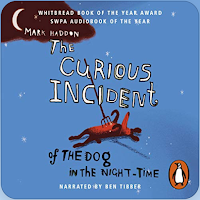The Curious Incident of the Dog in the Night-Time, by Mark Haddon
 I first read this an age ago, before I had children or that much knowledge of autism. It's been a strange thing to revisit now I have more experience.
I first read this an age ago, before I had children or that much knowledge of autism. It's been a strange thing to revisit now I have more experience. This audio version is largely narrated by Ben Tibber as 15 year-old protagonist Christopher Boone from Swindon, but with a full cast playing the other characters. That works very well. We see (or hear) events as Christopher understands them. He has an eye for and takes satisfaction in detail, and we often get raw, unembellished facts, whether about his own anxieties and bodily functions or grown-ups' sex lives, swearing and violence.
His hyper-focus on particular things - prime numbers, colours, smells - and his bluntness are often funny. I've seen some readers object to this, feeling that we are led to laugh at Christopher. But I think something else is going on; we laugh because we understand the way he sees the world. It comes about through empathy.
That, I think, plays off against the more disturbing stuff. The world is a scary place. A whole load of things terrify Christopher (noises, strangers, things that are brown) and sometimes leave him unable to speak (except to us). There are also a whole load of things that he doesn't quite comprehend - but we do as readers.
Reading the book again now, what strikes me is how many of the characters are cross, impatient, at the end of their tether and sometimes downright cruel. That's in direct contrast to us as readers, comprehending of and amused by this boy. We embrace the ways he thinks differently; they just lose their tempers.
Christopher can certainly be exasperating and exhausting, and the grown-ups are fallible, flawed people. There are things here I recognised as the parent of an autistic child. But the over-riding sense, I think, is one of sadness because Christopher is not exactly surrounded by kindness. There's a lot of chaos and argument (which I can empathise with) but not a lot of joy. As a result, I think we judge his parents, his neighbours, his teachers, the police... The empathy for him is not extended to them. And I think that's an an issue given that some of their bad behaviour is rather contrived.
I keep picking over a key element of the plot. As Christopher determinedly investigates the murder of his neighbour's dog, he unravels an audacious falsehood that has been told to him and others for some time. Yes, I can see how Christopher would be duped because he takes what he's told at face value. But that doesn't apply to anyone else: have they really not questioned or checked what has been said about something so fundamental? When the lie is exposed, is there no consequence for the liar? The school, the police, the neighbours... no one seems very bothered.
At the end, Christopher seems liberated by a number of things that have happened over the course of the story: his schoolwork, his trip to London, his unravelling of the mystery. He's written this account - this book - and feels he can achieve anything. I'd like to believe so but I'm not sure surviving an ordeal is the same as learning from it. What will he and those around him do differently to avoid another crisis, or deal with it better when it comes?
But I'm not sure if that's a criticism of the book or a sign of how much it got under my skin.
Simon Guerrier's Blog
- Simon Guerrier's profile
- 60 followers



